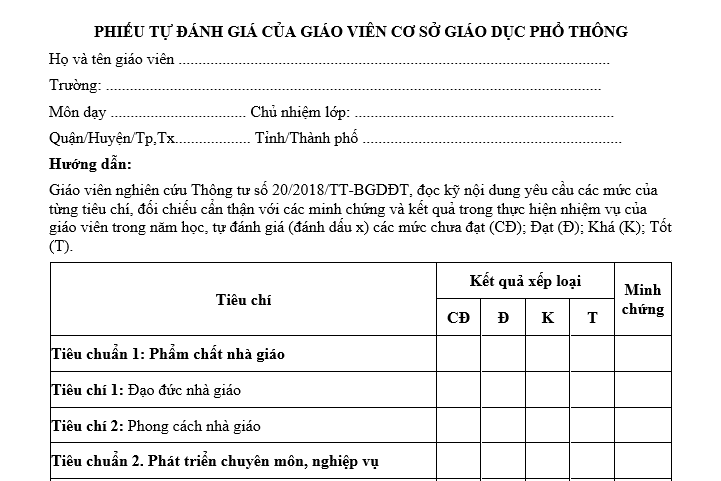What are the details of guidance on assessment based on teacher professional standards in Vietnam?
What are the details of guidance on assessment based on teacher professional standards in Vietnam?
The guidance on assessment based on teacher professional standards in Vietnam are as follows:
(1) Levels of assessment of teachers' professional standards:
Based on the regulations in the Professional Standards for General Education Teachers issued together with Circular 20/2018/TT-BGDDT, the assessment of teachers according to professional standards is the process of determining the level of achievement in teachers' qualities and competencies as stipulated by the professional standards.
According to Chapter 2 of the Professional Standards for General Education Teachers issued together with Circular 20/2018/TT-BGDDT, which is temporarily suspended by Clause 2, Article 1 of Circular 29/2021/TT-BGDDT, there are usually three levels for evaluating teachers' professional standards: Achieved, Fair, and Good. However, the criterion for "Self-Professional Development" currently has only two assessment levels: Fair and Good.
(2) 15 criteria for evaluating teachers' professional standards and specific assessment levels
Standard 1. Teachers' Qualities
Adheres to regulations and practices for teachers' ethics; shares experiences and supports colleagues in practicing ethics and establishing a teaching persona.
- Criterion 1. Teachers' Ethics
+ Achieved: Strictly complies with the regulations on teachers' ethics;
+ Fair: Has a spirit of self-learning, self-discipline, and strives to improve their ethics;
+ Good: Is an exemplary model in teachers' ethics; shares experiences and supports colleagues in practicing teachers' ethics.
- Criterion 2. Teachers' Persona
+ Achieved: Has a manner and working style suitable for the job of a general education teacher;
+ Fair: Has a conscious effort to cultivate an exemplary teaching persona; has a positive influence on students;
+ Good: Is an exemplary model in teachers' persona; has a positive influence and supports colleagues in forming a teaching persona.
Standard 2. Professional and Skill Development
Has thorough expertise and proficient skills; regularly updates and enhances professional and skill capabilities to meet the requirements of education innovation.
- Criterion 3. Personal Professional Development
+ Fair: Proactively studies and updates promptly to meet the new requirements for professional knowledge; creatively and adequately applies forms, methods, and selects content for study, retraining, and improving personal professional capabilities;
+ Good: Guides, supports colleagues, and shares experiences in personal professional development to meet the requirements of education innovation.
- Criterion 4. Planning Teaching and Educational Activities Towards Developing Students’ Qualities and Competencies
+ Achieved: Can build teaching and educational plans;
+ Fair: Proactively adjusts teaching and educational plans appropriate to the school's and locality's actual conditions;
+ Good: Guides and supports colleagues in constructing teaching and educational plans.
- Criterion 5. Utilizing Teaching and Educational Methods Towards Developing Students’ Qualities and Competencies
+ Achieved: Can apply teaching and educational methods to develop students' qualities and competencies;
+ Fair: Proactively updates, flexibly and effectively employs teaching and educational methods to meet innovation requirements, suitable for actual conditions;
+ Good: Guides and supports colleagues in knowledge, skills, and experiences in employing teaching and educational methods towards developing students' qualities and competencies.
- Criterion 6. assessment Towards Developing Students’ Qualities and Competencies
+ Achieved: Uses methods to evaluate students' learning progress and outcomes;
+ Fair: Proactively updates and creatively applies forms, methods, and tools for assessment towards developing students' qualities and competencies;
+ Good: Guides and supports colleagues with effective implementation experiences in evaluating students' learning progress and outcomes.
- Criterion 7. Counseling and Supporting Students
+ Achieved: Understands students and grasps regulations on student counseling and support; integrates counseling and support activities into teaching and educational activities;
+ Fair: Effectively implements appropriate measures for counseling and supporting different types of students in teaching and educational activities;
+ Good: Guides and supports colleagues with effective implementation experiences in student counseling and support activities in teaching and educational activities.
Standard 3. Building Educational Environment
Implements the construction of a safe, healthy, democratic educational environment, preventing school violence.
- Criterion 8. Building School Culture
+ Achieved: Fully complies with rules and cultural behavioral codes of the school as prescribed;
+ Fair: Proposes measures to effectively implement rules and cultural behavioral codes of the school as prescribed; promptly and effectively handles violations of rules and cultural behavioral codes in the class and the school within the scope of responsibility (if any);
+ Good: Is an exemplary model, sharing experiences in building a healthy cultural environment in the school.
- Criterion 9. Implementing Democratic Rights in the School
+ Achieved: Fully complies with regulations on democratic rights in the school, organizing students to exercise democratic rights in the school;
+ Fair: Proposes measures to promote the democratic rights of students, oneself, parents, or guardians, and colleagues in the school; promptly detects, reports, stops, and handles violations of students' democratic regulations (if any);
+ Good: Guides and supports colleagues in implementing and promoting the democratic rights of students, oneself, parents, or guardians, and colleagues.
- Criterion 10. Implementing and Building a Safe School, Preventing School Violence
+ Achieved: Fully complies with the school's regulations on a safe school, preventing school violence;
+ Fair: Proposes measures to build a safe school, preventing school violence; promptly detects, reports, stops, and handles violations of the regulations on a safe school, preventing school violence (if any);
+ Good: Is an advanced model in implementing and building a safe school, preventing school violence; shares experiences in building and implementing a safe school, preventing school violence.
Standard 4. Developing Relationships Between School, Family, and Society
Participates in organizing and implementing activities to develop relationships between school, family, and society in teaching and educating students' morals and lifestyle.
- Criterion 11. Building Cooperative Relationships with Parents or Guardians of Students and Related Parties
+ Achieved: Fully complies with current regulations regarding parents or guardians of students and related parties;
+ Fair: Builds healthy, trusting relationships with parents or guardians of students and related parties;
+ Good: Proposes measures to the school to strengthen close cooperation with parents or guardians of students and related parties.
- Criterion 12. Cooperating Among School, Family, and Society to Implement Teaching Activities for Students
+ Achieved: Provides sufficient, prompt information about students' learning and training conditions in class; information on the curriculum, teaching plans for subjects, and educational activities to parents or guardians of students and related parties; receives information from parents or guardians of students and related parties about students' learning and training conditions;
+ Fair: Proactively cooperates with colleagues, parents or guardians of students, and related parties in implementing measures to guide, support, and motivate students to study, implement curriculum, teaching plans for subjects, and educational activities;
+ Good: Promptly handles feedback from parents or guardians of students and related parties about the learning, training, and implementing curriculum, subject teaching plans, and educational activities of students.
- Criterion 13. Cooperating Among School, Family, and Society to Educate Students' Morals and Lifestyle
+ Achieved: Participates in organizing, providing information on school rules and cultural behavioral codes to parents or guardians of students and related parties; receives information from parents or guardians of students and related parties about students' morals and lifestyle;
+ Fair: Proactively cooperates with colleagues, parents or guardians of students, and related parties in implementing moral and lifestyle education for students;
+ Good: Promptly handles feedback from parents or guardians of students and related parties about educating students' morals and lifestyle.
Standard 5. Using Foreign Languages or Ethnic Languages, Applying Information Technology, Exploiting and Using Technological Devices in Teaching and Education
Able to use foreign languages or ethnic languages, apply information technology, exploit and use technological devices in teaching and education.
- Criterion 14. Using Foreign Languages or Ethnic Languages
+ Achieved: Can use simple communication words in a foreign language (prioritize English) or a second foreign language (for foreign language teachers) or ethnic languages for positions requiring the use of ethnic languages;
+ Fair: Can exchange information about simple, familiar daily topics or simple, familiar topics related to teaching and education activities (prioritize English) or know a second foreign language (for foreign language teachers) or ethnic languages for positions requiring the use of ethnic languages;
+ Good: Can write and present simple paragraphs about familiar topics in teaching and education activities (prioritize English) or a second foreign language (for foreign language teachers) or ethnic languages for positions requiring the use of ethnic languages.
- Criterion 15. Applying Information Technology, Exploiting and Using Technological Devices in Teaching and Education
+ Achieved: Able to use basic application software, technological devices in teaching, education, and student management according to regulations; completes training courses in exploiting and applying information technology and technological devices in teaching and education according to regulations;
+ Fair: Applies information technology and digital learning materials in teaching and education activities; updates and effectively uses application software; exploits and uses technological devices in teaching and education activities;
+ Good: Guides and supports colleagues to enhance their capacity in applying information technology; exploits and uses technological devices in teaching and education activities effectively.
(3) assessment Cycle
Based on Article 11 of the Professional Standards for General Education Teachers issued together with Circular 20/2018/TT-BGDDT, which stipulates the time for evaluating teachers' professional standards, teachers at general education institutions self-evaluate according to professional standards once per year.

What are the details of guidance on assessment based on teacher professional standards in Vietnam? (Internet image)
Where to Download the Teacher's Self-assessment Form?
Based on Appendix 2 issued along with Official Dispatch 4530/BGDDT-NGCBQLGD 2018, the self-assessment form for teachers at general education institutions is as follows:

>> Download the teacher's self-assessment form:
Who is Responsible for Directing and Organizing the assessment of Teachers According to Professional Standards in Vietnam?
Based on Article 16 of the Professional Standards for General Education Teachers issued together with Circular 20/2018/TT-BGDDT as follows:
Responsibilities of general education institutions
1. The head of the general education institution directs and organizes the assessment of teachers according to professional standards; updates and reports the assessment results of teachers according to professional standards to the higher management authority.
2. Develops and implements training, retraining, and development plans for the teaching staff at the general education institution based on the assessment results according to professional standards.
...
The head of the general education institution is responsible for directing and organizing the assessment of teachers according to professional standards.

